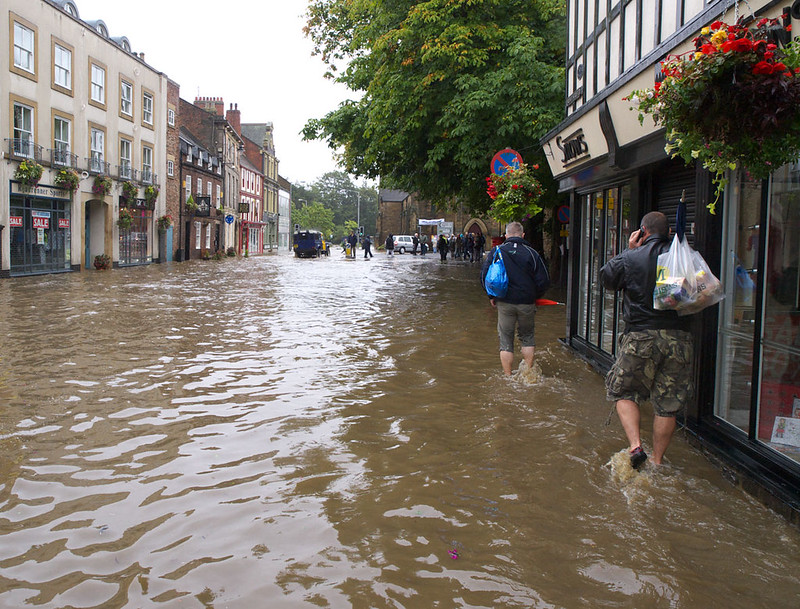Most businesses have already been hit by extreme weather, but still aren’t preparing for future climate disruption

A blog post by Professor Suraje Dessai from the School of Earth and Environment, and Professor Declan Conway, London School of Economics and Political Science
Watching news reports of severe flooding in Europe, of devastating wildfires in the US, of melting ice caps at the poles, very few people now would deny that our climate is changing. The UK’s Environment Agency has just warned in a new report that the country is not ready for climate disruption and that it must “adapt or die”. And while it’s clear that global leaders must work together to reduce greenhouse emissions, what’s not yet apparent to many is how managers in individual businesses must start to plan to adapt for extreme weather.
Adapting to climate disruption means building resilience to current extreme weather – flood-proofing for basements affected by the London flash floods in July 2021, perhaps. But it also means planning for a future which, according to UK Met Office projections, will involve “warmer and wetter winters, hotter and drier summers, and more frequent and intense weather extremes”. That will mean more detailed heatwave action plans, reductions in water use in some areas, and defences against bigger floods than today’s architects ever planned for.
So we have some idea of what needs to happen. But, while the UK has highlighted adaptation as one of four crucial goals to be addressed at the international climate conference COP26 in November 2021, it is not clear how well organisations are prepared for these new challenges.
With our colleague Denyse S. Dookie, also in the Centre for Climate Change Economics and Policy, we addressed this question earlier this year when we surveyed 2,400 people working in organisations in roles related to organisational planning. Our results have just been published, and we found that the vast majority of organisations in the UK are unprepared for the extreme weather disruption that the climate crisis will increasingly bring. Only one in eight have comprehensively assessed the risks of extreme weather disruption, and only one in six have a plan for adapting to future climate change.

Low water levels at a reservoir in Scotland. UK summers will generally be hotter and drier, but punctuated by more intense rainstorms. Colin Ward / shutterstock
This is despite three in five respondents saying their organisation had been affected by extreme weather in the past three years, mostly negatively. Flooding tops respondents’ fears of climate disruption, followed by severe coastal flooding and an intense heatwave lasting a week, while a very mild winter was perceived as a small opportunity. Constructing a more detailed assessment of the economic effects of extreme weather will help build the case for adaptation action and for targeting initiatives.
The effects of climate change on the UK were ranked fifth by the survey respondents out of 11 issues across all UK nations and sectors as a concern faced by organisations. This places it above Brexit (ranked sixth, identified by 57%). Notably, concerns over the implications of government policy to reduce greenhouse gas emissions ranked highly too, at seventh. The top-ranking issue was concern about the ongoing pandemic.
We also asked about organisations’ risk response and approaches to planning. Our survey results support a picture of UK organisations that are taking steps to prepare for similar extreme weather, with the top three actions of organisations affected being capacity training or some form of knowledge transfer, investment in new technologies, and making an insurance claim. While just 16% of organisations reported having an adaptation plan, a considerable proportion (37%) said their organisation was planning to develop one.
But that still leaves us with almost half the organisations having no plan and not even plans for a plan. Barriers they cited include insufficient financial resources; complacent organisational or staff attitudes towards climate change; difficulty identifying effective measures; lack of access to, or awareness of, new technologies; and other matters taking higher priority.
So what should organisations do? Recent experiences provide a strong foundation for promoting more action, particularly establishing a more detailed evidence base to make the case for the cost-effectiveness of taking action now. Almost half the organisations affected by extreme weather followed a plan to cope with the situation. Evaluating how well these plans worked could help improve them and modifying them to consider contingencies for more frequent and intense events would help build resilience to future risks. The lessons and insights could be shared through trade networks. A good place to start with a practical approach is the University of Oxford’s “adaptation wizard”.
And what about the role of government? Most respondents felt that the government should provide more information about the effects of climate change in the UK, plus funding, subsidies or tax breaks for adaptation, and that it should demonstrate how climate change is relevant to specific kinds of organisations. Overall, organisations see a strong role for leadership from government and collective responsibility for adaptation, which should be recognised in efforts to promote plans to adapt to climate disruption.![]()
This article is republished from The Conversation under a Creative Commons license. Read the original article.
